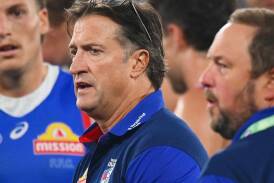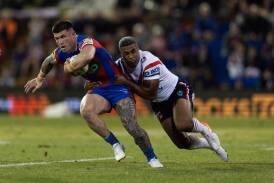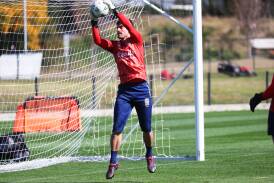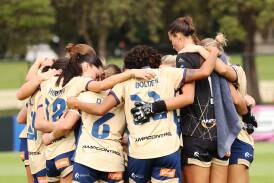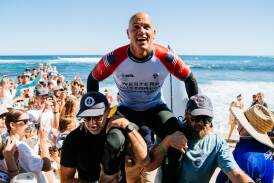THE winter sporting season is in full swing, with hundreds of thousands of dollars being forked out by parents of more than 40,000 Hunter children signing up.
Subscribe now for unlimited access.
$0/
(min cost $0)
or signup to continue reading
The Newcastle Herald has investigated the pricing of some of the most popular team sports for a child around the age of 12 – and the variation was significant, ranging from $50 to $800.
The most popular sports in the Hunter are football (soccer) with 15,600 juniors and netball with 9600 participants.
Next in is rugby league at 7170 players, then hockey at 2000 and basketball at 1870 (not including its after-school program).
Rugby union has 1630 Hunter registrations, followed by the fast-growing AFL at 970 players.
Soccer was the biggest drain on the wallet if the child followed an elite sporting path through the National Premier League, which starts at under13s.
Prices ranged from about $595 to $800 among the clubs, which are responsible for setting their own costs.
Northern NSW Football chief executive David Eland acknowledged it ‘‘costs more to play football than some other sports’’.
‘‘However football is not expensive,’’ he said.
‘‘The registration fees charged by National Premier League clubs represent great value when the standard of the coaching, competition and facilities is considered.’’
Players in this league generally start their training in the September before the winter season kicks off.
Broadmeadow Magic Football Club secretary Stephen Pichaloff said parents of junior players would be set back $750 to sign up with them, including all the registration fees.
Included in this is a number of uniforms: a training kit, warm-up kit and playing kit, along with tracksuits and shirts. An accredited coach trains them while there is also a technical director employed at the club to oversee training programs.
‘‘It’s a pretty good price, we’re actually running at a loss,’’ Pichaloff said.
For those participating in zone, or community, soccer the cost was dramatically cheaper – a one-off registration fee between the $130 and $180 mark. Those prices included the registration fee of $90, administrative costs, trophies and jerseys.
Along with soccer boots, parents typically also have to factor in $20 for shorts and $10 for socks, although in some instances they were provided.
One of the cheapest options for parents was rugby union – specifically The Waratahs Junior Rugby Club.
This year it charged $50 for kids to sign up in an attempt to attract more players.
Registrar and secretary Kate Gunn said they had no luck, though.
‘‘Newcastle is basically a Knights and Jets town,’’ she said. ‘‘It’s very hard to get kids to play rugby union and hard to get support.
‘‘We put our prices down in the hope to attract more players but it didn’t work really – we only got three new players this year.’’
Gunn said they were running at a loss, using local sponsors, fund-raising and existing club funds to ease the drain on parents’ hip pockets.
‘‘We cover about $150 per player including everything, so all they need to pay for is shoes and a mouthguard on top of the $50 fee for the season,’’ she said.
Other union clubs were a bit more expensive – for instance Merewether Carlton juniors charged $130 for the season for an under12s player.
Rugby league was about the same price as most rugby union clubs, costing roughly between $120 and $140 to sign up for the season, with uniform sometimes included.
Graeme Fitzgerald from South Newcastle Junior Rugby League said they asked for $120 and that included insurance, ground hire for the season and referee fees and an NRL pass for the player.
He said the jersey was provided but they had to buy their own shorts and socks for about $30, along with a compulsory mouthguard.
The second most popular sport in the region, netball, will charge you between between $115 and $130 to sign up an under12s player.
Newcastle Netball Association president Adele Saunders thought it was ‘‘one of the cheapest sports you can play’’.
‘‘We’re out of pocket, but we’re passionate about the game,’’ she said.
‘‘Beat N Cancer’’ Netball Club president Cherie Aoake Puru said they charged $120 for the 14 base-game season.
‘‘That includes light fees, they do an hour-and-a-half training a week, it includes training balls and equipment, two sets of bibs plus the presentation trophies,’’ she said.
She said it cost $130 for a uniform. Her daughter, who is 12, used the same outfit for five years.
Basketball was a more expensive choice – all up it cost about $330.
Port Hunter Basketball Club registrar and treasurer Garry Craig said there was a $90 registration fee with Basketball NSW and then their club charged $240.
This included the uniform, except shorts, and a presentation trophy at the end of the year.
Craig said their club was about mid-range in terms of its pricing.
Lakers Basketball Club president Keith Paton said they charged $200 on top of registration, with shorts also costing $35.
‘‘Netball is an outdoor sport, whereas the electricity fees are exorbitant for indoor sports like basketball,’’ he explained.
‘‘That’s why it would be hard to compare netball with basketball.’’
Hockey was also a more expensive sport to enrol a child with.
‘‘The average price to play junior hockey is about $300,’’ South Newcastle Hockey Club junior women’s convener Robyn Skene said.
This takes into account NSW registration ($68.50) and an additional fee for joining the men’s or women’s district ($50) while the club usually charges about $200.
‘‘That’s because the turf fee is quite high,’’ Skene said, adding that teams trained twice a week.
She explained that parents would also need to invest in a hockey stick, which could cost anywhere between $50 and $300, a mouthguard and special hockey shoes.
AFL, one of the smallest codes in the Hunter, charged parents between $95 and $110 for the season.
Lake Macquarie Dockers Australian Football Club junior president Terri Kozlik said their club charged $95 for the year, with parents needing to also buy $10 socks and $30 shorts.
‘‘Jerseys are included from game sponsors,’’ she said.
‘‘Rugby and soccer are more dominant, the code is growing though.
‘‘It’s a little community, like a family because it is smaller.’’
A Cardiff Hawks Australian Football Club spokesman said they charged $110, with $30 also needed to be paid for shorts and socks.
There were also deals where it progressively became cheaper for parents as they enrolled more of their kids into the code.
For example, it would cost $95 for the first child, $85 for the second and no charge for the third.
IT’S enough to buy a car, or could go towards a deposit on a house.
However, Nicole Abell says the $20,000 she and her husband Shane spend each year so their four children can play sport is a worthy investment.
Mrs Abell recently spent a week in Perth where her son, Noah, 14, competed in an under-15 representative hockey tournament.
‘‘That trip alone cost $5000,’’ she said.
‘‘I guess you could take your family to Fiji for that, but we end up spending our holidays at sporting fields.
‘‘We’re only on a middle-range income – we’re both teachers.
‘‘I’ve never actually sat down and officially worked out how much we spend – I think I’m a bit scared.
‘‘I’d say it would be between $15,000 and $20,000 a year, though.’’
Mrs Abell, from Rankin Park, said her family made sacrifices so that the children – Maliah, 8, Teyjah, 12, Noah, 14, and Kiahni, 16 – can play all the sport they wanted to.
That list includes soccer, hockey, trampolining, gymnastics, cricket, swimming and water polo.
Home renovations keep getting put on the backburner and they’ve opted for public school over private.
She said it was a shame a lot of other families were not be able to afford to get so involved in sports, particularly when childhood obesity was such a big issue.
‘‘I think the higher you go with representative sport, the more costly it becomes,’’ she said.
‘‘I just love watching them play and don’t want to stop them doing what they love.’’
Mrs Abell’s schedule makes you tired just hearing about it.
She usually gets up at 6am three days out of five to take her children to training sessions.
Then, each night after school it’s a juggling act to take her kids to more training or sporting activities – on Fridays she usually doesn’t get home until 10pm.
Then on Saturday it’s a 6am start for her youngest daughter’s swimming lesson, followed by sport throughout the day for all the kids.
Sundays are a chance to rest unless there’s a sporting carnival or another event on.
‘‘We have to use a big planner to co-ordinate it all,’’ Mrs Abell said.
‘‘We’re never at home, I think most of my wardrobe is in the car.
‘‘I look a bit frazzled, but I’m just grateful I have happy, healthy children.’’

